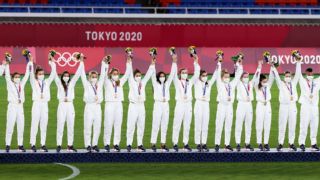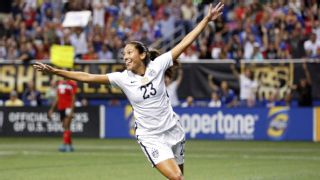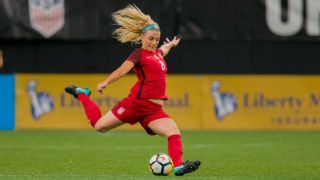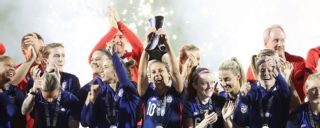|
The United States women's national team continues to beat the best the world has to offer on the soccer field, sweeping England, Japan and Spain to win the 2020 SheBelieves Cup after earlier qualifying for this summer's scheduled Olympics. Players continue to push for societal change, their equal pay lawsuit winding its way through the court system. But even the highest-profile team in women's sports must hit pause while the world struggles with the coronavirus pandemic. While we all wait, let's look at the state of the U.S. women's national team on and off the field. How does the COVID-19 pandemic affect the women's national team?Like essentially everything else in the sports world at the moment, we don't know when the U.S. will play its next game. In response to the pandemic, U.S. Soccer canceled April friendlies against Australia and Brazil. Additional games had not been officially announced. The U.S. played 15 games before the Olympics in 2016, including six warm-up games after the CONCACAF qualifying tournament and SheBelieves Cup. It probably intended to follow a similar plan this year. It's too early to know what the landscape will look like in June and July as far as warm-up games, but it's safe to say that an already-condensed timeline U.S. coach Vlatko Andonovski inherited after taking over from Jill Ellis last fall just got that much more condensed. "It's not helpful," Andonovski acknowledged to ESPN. "Obviously I wanted to play as many games, have as many trainings as possible and watch NWSL games on a regular basis and watch their trainings on a regular basis, so I can make the best decisions that I can. ... But at this point, with the pandemic and the virus situation, figuring out a way to take care of that is more important. The health and the lives of people are more important than anything else. So we're not as worried about preparation." - USSF takes conciliatory tone in new legal filings
- USWNT lawsuit versus U.S. Soccer explained
- Japan FA chief diagnosed with coronavirus after U.S. trip A U.S. Soccer spokesperson said Monday that players were briefed by medical staff on best practices to avoid the spread of the virus before they returned to their home cities after the SheBelieves Cup. U.S. Soccer knew of no testing being coordinated by the federation in players' respective home cities but "would do whatever needed to help our players in all ways." According to an Associated Press report Tuesday, the head of the Japanese FA tested positive for the virus. Kozo Tashima was in the United States during part of the recent SheBelieves Cup. The AP report said he arrived in Tokyo on March 8, which was the same day Japan played England in Harrison, New Jersey. He had previously been in Orlando, Florida, where Japan played Spain on March 5. The U.S. subsequently played Japan in Frisco, Texas on March 11. Prior to that report, Andonovski said he and his staff were working on a process to communicate with players as they wait through the postponed start of the NWSL preseason. In addition to the normal routine of sending video analysis and setting up calls to talk about those details, the staff is putting together outlines for physical workouts -- something normally left to the club teams once players are in those markets. "We're going to try to do all kinds of different things to keep them as ready as they can be for the next challenge," Andonovski said. Central to any future scheduling, of course, is the idea that there will be an Olympic tournament in Japan this summer. The IOC and local organizers have generally indicated that remains their plan, despite the obvious problems of not just containing the virus in the host country but in the countries sending athletes and fans to the Games. A U.S. Soccer spokesperson said the federation had no set contingency plans for cancellation or postponement but remains in contact with the United States Olympic Committee.  Where do things stand in the courtroom?The latest round of filings in the ongoing pay discrimination lawsuit came Monday, the continuation of each side's motion for summary judgment. If Judge R. Gary Klausner does not rule in favor of either side in regard to full or partial summary judgment, the trial is scheduled to begin May 5. Monday's exchange of filings were the first since Carlos Cordeiro resigned as U.S. Soccer president in the face of public and sponsor criticism about language and arguments in previous filings that was widely viewed as sexist. Both Cordeiro, before he resigned, and interim president Cindy Parlow Cone conceded those arguments were objectionable and apologized in public statements. The federation's tone in the new filings was more conciliatory, but the arguments, sans some of the objectionable lines of reasoning, were largely the same made throughout the lawsuit centering on rates of pay, the collective bargaining agreement signed in 2017 and prize money from FIFA. That means the gulf between the sides shows little sign of closing. It remains to be seen if replacing Cordeiro with a former player, but with the federation's board of directors otherwise left in place, will move the two sides any closer to a pre-trial resolution.  Is Christen Press the most important women's national team story of 2020?There does seem to be an element of "life begins at 30" for the U.S. women's national team. Forward Carli Lloyd was 32 when she took the world by storm during the 2015 World Cup. Megan Rapinoe had just turned 34 when she and her teammates won another star last summer. And so far, 2020 looks pretty darn promising for Press at 31. As with Lloyd and Rapinoe before their most memorable tournaments, the U.S. forward is already an enormous star. Press has two World Cup titles and nearly 150 caps for her country. But perhaps to a greater degree than almost anyone who ever played for the team, there was a nagging sensation that Press was regularly the unlucky one left standing in the game of musical chairs surrounding tactics, formations and depth charts. She never quite had a permanent role. She never quite had the full confidence of her coaches. She never quite fit as seamlessly as someone so sublimely talented should have. Perhaps no more. Andonovski watched Press punish opponents over the years in the NWSL and encouraged her to do the same for country -- to have fun and be herself whether playing in one of the wide positions among the three forwards or the No. 9 in the middle. "I've known her now for years, and every year she would score these unbelievable goals in the league and do some very good things on an individual basis," Andonovski said. "I just wanted to allow her to bring her creativity to the team, I didn't want to limit her creativity in any way. So for me, I felt like I needed to be there to give her guidance more so than tell her exactly what to do." After scoring five goals in Olympic qualifying, Press arguably looked even better against more challenging competition in the SheBelieves Cup. She scored a pair of memorable goals, one against England and another against Japan, and assisted on the winner against Spain. While there was little doubt that she would be on the 18-player Olympic roster, Press seizing her opportunity to such a degree makes the competition on the front line that much more intense. If Press, Tobin Heath, Lloyd and Rapinoe are locks, that leaves one or perhaps two spots for other forwards. And while the lack of additional camps, friendlies or NWSL games will make it difficult for many players to make their cases, Lynn Williams is one player who already has. Brought back into the fold by Andonovski after falling out of the mix under Ellis prior to the last World Cup, Williams has played nearly 400 minutes in the team's eight games in 2020 and has specific game-changing skills that make her appealing in an Olympic setting. "Her ability to get behind the back line is something that makes her special," Andonovski said. "She has great penetration on the runs but also great penetration on the dribble. One other thing she brings is her ability to defend. With Lynn in the front line, anywhere in the front line, we're just more aggressive when we have to defend higher up the field." World Cup winners Jessica McDonald and Mallory Pugh also remain in the running at forward for Andonovski, who said this week that the 18-player roster is far from set. And the wild card, of course, remains Alex Morgan, who is due with her first child next month but has previously stated her desire to compete in the Olympics. "With Alex, obviously, we're all focused on her delivering a healthy baby," Andonovski said. "Once that is over, the next step will be how to get her back fully fit and at full strength as soon as possible."  Is the midfield the right kind of problem to have?You want answers to most questions. It would certainly be beneficial for the U.S. to know when it will play again or if the Olympics would happen. It would help everyone to have resolution on the lawsuit. It would probably even make life easier for Andonovski to know which forwards are going to Japan -- and especially if Morgan will be in form to be among them. But the longer the U.S. doesn't have an answer to its midfield conundrum, the better. Having four world-class options for three starting spots is among the best reasons to back the U.S. to become the first team to win World Cup and Olympic titles in back-to-back years. Mostly, of course, the debate involving Julie Ertz, Lindsey Horan, Rose Lavelle and Sam Mewis becomes a debate about Horan and Mewis. The four can just about interchange in any roles, but Ertz as the defensive midfield presence and Lavelle as the attacking presence are natural fits. So far, with four goals and an assist for Mewis and seven goals and three assists for Horan in nearly equal minutes, the competition doesn't seem to be hurting anyone except opponents. It's likely to stay that way through Tokyo. Interesting, though, Andonovski sounded like someone who wasn't entirely averse to finding ways to get all of them on the field in a post-2020 world. "Once I took the job, by the second camp we had to go into Olympic qualifiers, so we didn't have time to experiment with anything," Andonovski said. "Then we went into SheBelieves, and a couple more camps and we're going into the Olympics. So there definitely isn't time to implement any major changes. I'm not saying I would [anyway] by any means, but I'm sure at some point we'll try different things just to know whether it works or not or how that works."
|

